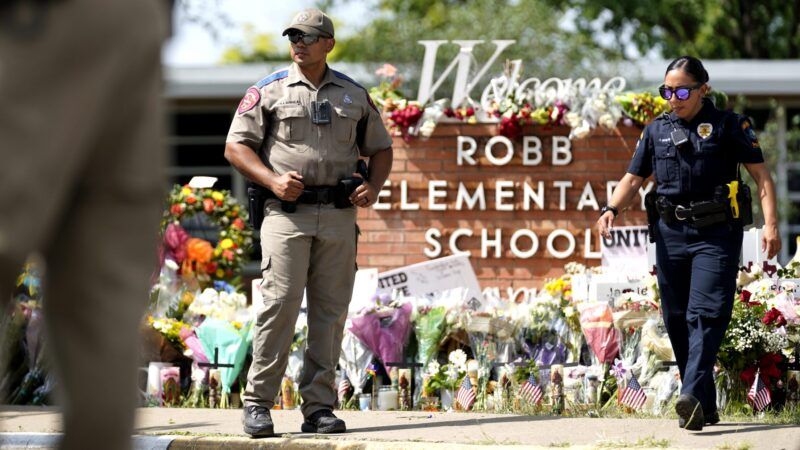Will the Uvalde Shooting Prompt Texas To Finally Close a Police Secrecy Loophole?
Texas law allows police to withhold records of suspects who were never convicted. Police abuse it to hide records from families, reporters, and lawyers investigating deaths in custody.

Outrage over the mass shooting in Uvalde, Texas, could finally lead to changes in the state's public records law to close a notorious loophole that lets police hide records of deaths in custody, the Texas Observer reports.
The Observer reports that Texas state Rep. Joe Moody (D–El Paso) has once again introduced a bill, H.B. 30, to close what's become known in the state as the "dead suspect loophole," an exception to Texas public records statute that allows police to withhold records in cases where the suspect of an investigation was never convicted of a crime.
That law was supposed to protect the privacy of the innocent, but as Reason reported in a 2018 investigation, it also became an increasingly frequent way for Texas police departments to hide records of suspects who died in police custody (and were therefore never convicted). Reason's investigation found that the statute was used by police to withhold records from family, reporters, and lawyers in at least 81 cases of deaths in custody.
A separate investigation by news outlet KXAN in November that focused on Texas' 21 largest police departments identified at least 154 public information requests related to 52 in-custody deaths that cited the exemption to withhold records.
Texas police agencies have largely relied on an exemption concerning ongoing investigations to withhold records related to the Uvalde shooting, where a gunman murdered 19 schoolchildren and two teachers. But because the shooter was killed by police, some of those records could theoretically be kept secret forever under the loophole. The City of Uvalde invoked the loophole, along with many other exemptions, when it denied public records requests from Texas Public Radio.
Moody has filed similar bills in the past four legislative sessions, but opposition from one of the state's powerful police unions, the Combined Law Enforcement Associations of Texas (CLEAT), has torpedoed the bills every time.
In 2019, CLEAT argued that Moody's Bill was "pushed by anti-police groups who want access to the information so they can post it on social media and trash officers who are involved in high profile incidents."
Moody fired back, saying CLEAT "stabbed me in the back and waged an outrageous campaign of outright lies and character assassination."
CLEAT once again opposes the legislation.
"Just like it has been in the past, this is a George Soros-funded fishing expedition that seeks to tear down our profession by false innuendo," CLEAT spokesperson Jennifer Szimanski told the Observer.
However, the usual hysterics may not get CLEAT as far this year. The intense, sustained public outrage over the catastrophic police response at Uvalde, combined with the avalanche of lies from officials in the aftermath of the shooting, has left police interests in the state with little political cover.
Dade Phelan, Republican speaker of the Texas House, tweeted his support for closing the dead suspect loophole in June.
More than anything, the families of the #Uvalde victims need honest answers and transparency. Period. It would be absolutely unconscionable to use the "dead suspect loophole" to thwart the release of information that is so badly needed and deserved right now. #txlege???? https://t.co/OjtgRXYZ2H
— Dade Phelan (@DadePhelan) June 2, 2022
However, the bill would also have to get past the desk of Republican Gov. Greg Abbott, who threatened to veto the legislation in 2019.


Show Comments (23)